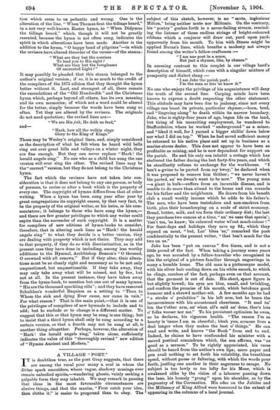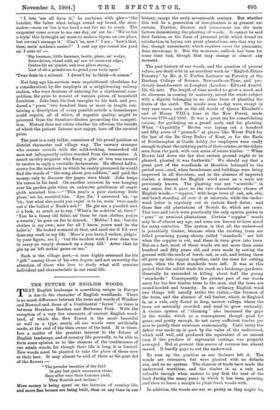are among the rural poor many a soul in. whom
the divine spark smoulders, whose vague, shadowy musings ever remain unbodied spirits,—wandering ghosts, vainly seeking a palpable form they may inhabit. We may remark in passing that ideas in the most favourable circumstances are elusive things, and that the maxim, "First catch your idea, then clothe it." is easier to propound than to obey. The subject of this sketch, however, is no "mute, inglorious Milton," being neither mute nor Miltonic. On the contrary, his " poetry " gushes forth in a never-failing stream, remind- ing the listener of those endless strings of bright-coloured ribbons which a conjuror will draw out, yard upon yard, apparently from his mouth. To him with fitness might be applied Burns's lines, which breathe a modesty not always found among the writer's fellow-craftsmen :—
"I am nae poet in a sense, But just a rhymer, like, by chance."
In amusing contrast to this oouplet is our village bard's description of himself, which runs with a singular mixture of pomposity and dialect slang :— "lam Jake the parish poet : I'm the man as lets 'ee know it."
No one who enjoys the privilege of his acquaintance will deny the truth of the second line. Carping minds have been known to express a doubt respecting the other statement. This attitude may have been due to jealousy, since not every village can boast its private, particular rhymer,—born, bred, and "lingering along" to death within its narrow boundary. Jake, who is eighty-four years of age, began life on the land, but tiring of his unexciting employment, he wandered to Staffordshire, where he worked " underground " as a miner, and "liked it well, for I yarned a bigger shillin' down below nor what I did on top." When he had saved sufficient money he returned to his native place and set up in business as a- marine-stores dealer. This does not appear to have been as profitable as mining, and he is now dependent for support on the parish. He and his only son inhabit a cottage which has sheltered the father during the last forty-five years, and which he steadfastly refuses to exchange for the workhouse. "1 ben't a-gwine to be parted from my bwoy," he declared when it was proposed to remove him thither; "we never haven't bin parted, an' we dwun't want to be now." The young man —a giant in bulk—suffers from an incurable disease, and is unable to do more than attend to the house and run errands for his father and the neighbours. He draws from his benefit club a small weekly income which he adds to his father's. The men, who have been teetotalers and non-smokers from birth, plan their housekeeping on a scale of strict economy. Bread, butter, milk, and tea form their ordinary diet ; the last they purchase two ounces at a time, " an' we uses that sperm';
'tisn't tea, 'ee knaw ; coloured water Wont much colour !" For feast-days and holidays they save up 9d., which they expend on meat, "but, Lor' bless 'ee," remarked the poet confidentially to the present writer, "that ben't much fur the two on us."
Jake has been "put on canvas" five times, and is not a little proud of the fact. When taking a journey some years ago, he was accosted by a fellow-traveller who recognised in him the original of a picture familiar through engravings in many a humble home. The old man is a picturesque model, with his silver hair curling down on his white smock, to which he clings, careless of the fact, perhaps even on that account, that the garment is out of date. His short, spare figure is but slightly bowed; his eyes are blue, small, and twinkling, and confirm the promise of his mouth, which betokens good humour and a shrewd mother-wit. A few months ago he had "a stroke o' pralattics " in his left arm, but he bears the inconvenience with his accustomed cheeriness. "It med ha' bin the t'other arm, an' when all's said an' done, ther's lots o' folks worser nor me." To his persistent optimism he owes, so he declares, his vigorous health. "The reason I'm sa, hearty is 'cause I am sa cheerful ; blesh you, arraone lives a deal longer when they makes the beat o' things." He can read and write, and knows "the Book" from end to end. Indeed, he claims to have confounded his minister with a sacred poetical conundrum which, the son affirms, was "as good as a sermon." To be rightly appreciated, his verse should be heard from the author's own lips; mere paper and pen avail nothing to set forth his volubility, the breathless speed, without pause or faltering, with which the words pour
forth, jostling one another in their eagerness to escape. No subject is too lowly or too lofty for his Muse, which is awakened alike by the vision of a labourer passing down the lane, his homely "prong" upon his shoulder, as by the pageantry of the Coronation. His odes on the Jubilee and the Millenary of King Alfred were honoured to the extent of appearing in the columns of a local journal.
"I lets 'um all have it," he exclaims with glee—" the butcher, the baker what brings round my bread, the shoe- maker—none on 'um is too hard a nut fur me to crack. The carpenter come across to ma one day, an' sez he We've bin a-tryin' this fartnight an' more to make a rhyme on our place, but we can't manage it.' 'Can't 'ee, now ? ' I sez ; how's that, then, seem' nothen's easier ? ' I cast my eye round his yard an' I outs wr
Big hammer, little hammer, beetle, plane, an' wedge, Screwdriver, chisel cold, an' saw we cross-cut edge ; Centre-bit an' gimlet, and iron pliers strong ; Last of all a grindstone to grind your tools upon.'
'Twas done in a minnut. I dwun't ha' to think—it comes."
Not long ago his services were requisitioned (doubtless for a consideration) by the employes at a neighbouring railway station, who were desirous of entering for a rhythmical com- petition, the prize to consist of various pieces of household furniture. Jake bent his best energies to his task, and pro- duced a "poem" two hundred lines or more in length, con- taining a description of every possible article a housekeeper could require, all of which, of superior quality, might be procured from the furniture-dealers promoting the competi- tion. History does not relate whether his effusion, the benefit of which the patient listener now enjoys, bore off the coveted prize.
The poet is a racy talker, conscious of his proud position as district rhymester and village wag. The unwary stranger who crosses swords with the mild-looking, besmocked old man not infrequently retires worsted from the encounter. A smart cavalry sergeant who flung a gibe at him was amazed to receive in reply a veritable declamation. He offered half-a. crown for the notebook in which he rashly presumed he would find the words of the song about you soldiers," and paid the money, only to discover the pages were blank. Jake keeps his verses in his head. On another occasion he was hanging over his garden-gate when an unknown gentleman of ample girth accosted him :—" This year's a poor castaway little place,' sez he, scornful-like. 'Aye, Sir,' I answered 'un, so 'tie; but what else could you expec' it to be, seem' twas made out o' the ballast o' Noah's ark ? ' He gin ma a puzzled sort o' a look, as much as to say, What's he a-drivin' at, then ?'
You be a funny old feller, an' them be rum clothes you're a-wearin',' he goes on fur to remark. Mebbe,' I sez, but the clothes is my own; now fur all I know, yours med be the tailor's.' He looked comacal at that, and axed ma if I'd ever done any work in my life. Moor'n you have, I reckon, judgiu' by your figure,' sez I; but the hardest work I ever done was to carry an empty stomach up a steep hill.' Arter that he gin up an' left mekin' game on ma."
Such is the village poet,—a man highly esteemed for his "gift', among those of his own degree, and not unworthy the attention of those who love to study what still remains individual and characteristic in our rural life.
THE FUTURE OF ENGLISH WOODS.



























































 Previous page
Previous page